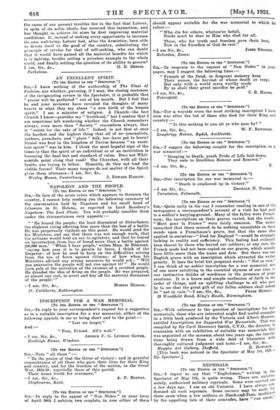[To THE EDITOR or THE " SPECTATOR."' Snt,—Quite early in
the war I remember reading in one of the newspapers a correspondent's account of a visit he had paid to a soldier's burying-ground. Many of the fallen were French- men; the inscriptions on their graves varied, but the words: "Mort pour la France " were fairly common. The writer remarked that there seemed to be nothing unsuitable in these words upon a Frenchman's grave, but that the same idea applied to ourselves—" Died for England "—would be strangely lacking in reality and sufficiency. This feeling had evidently been shared by those who buried our soldiers; at any rate, the French mode had not been copied on our graves, which usually bore little more than the name and date. But there was one English grave with an inscription which attracted the writer greatly. It bore the brief but pregnant words : "Not in vain." I can think of no nobler inscription for a war memorial, nor of one more satisfying to the essential shyness of our race, 10 our instinctive dislike of wordiness in the presence of great emotions. It is a brave and simple confession of faith in the order of things, and an uplifting challenge to all who pass by to see that the great gift of our fallen soldiers shall indeed


































 Previous page
Previous page